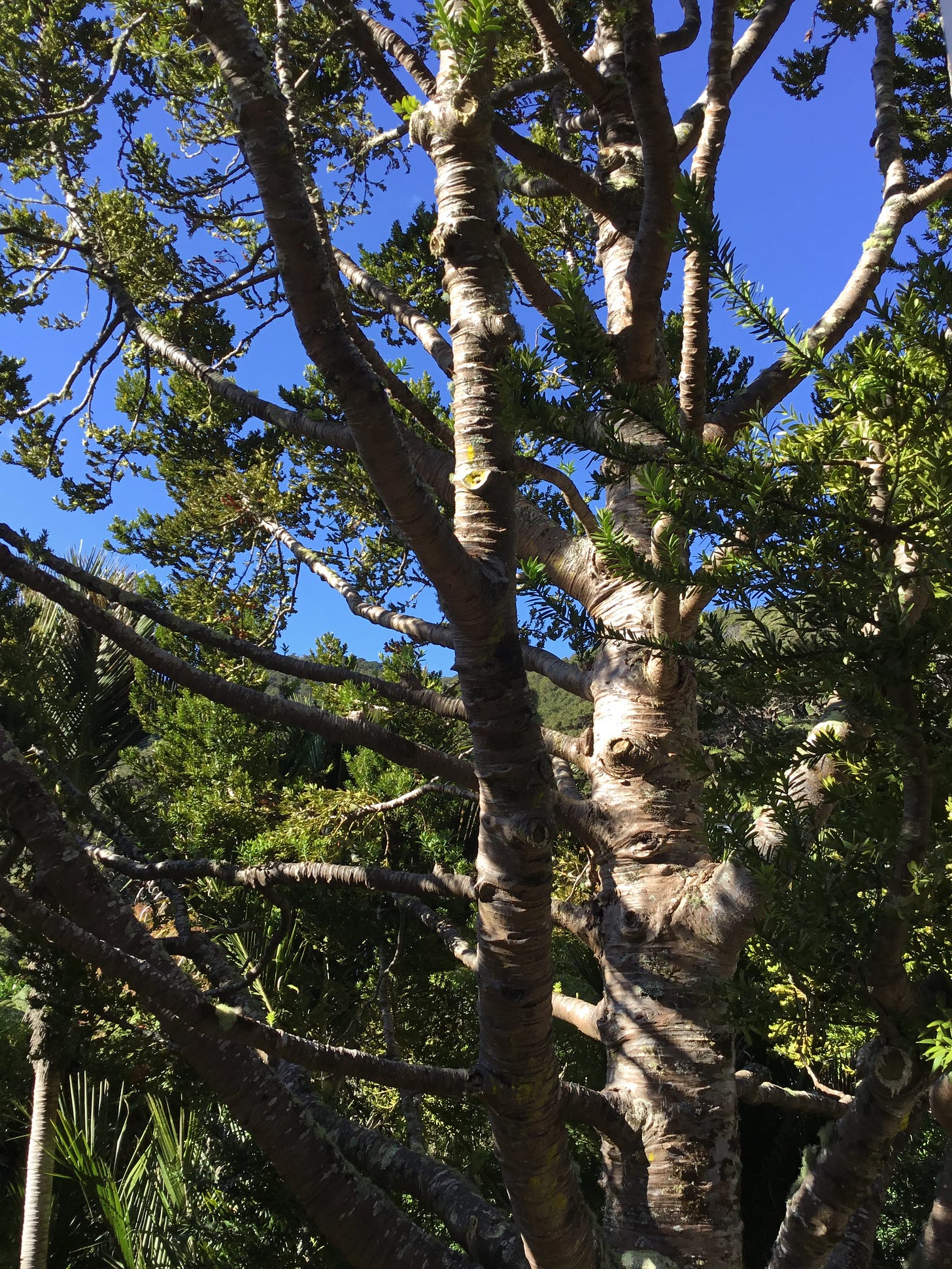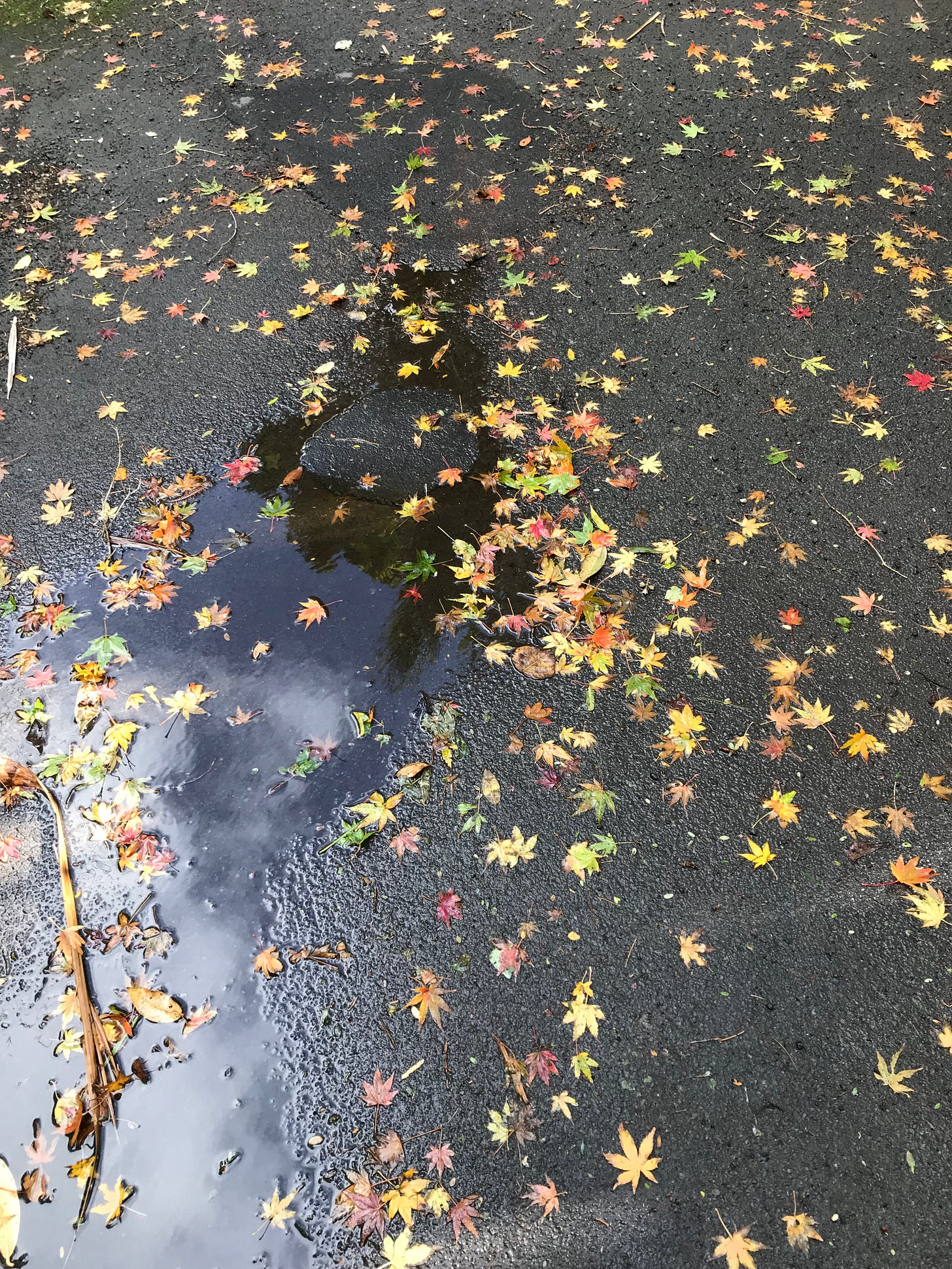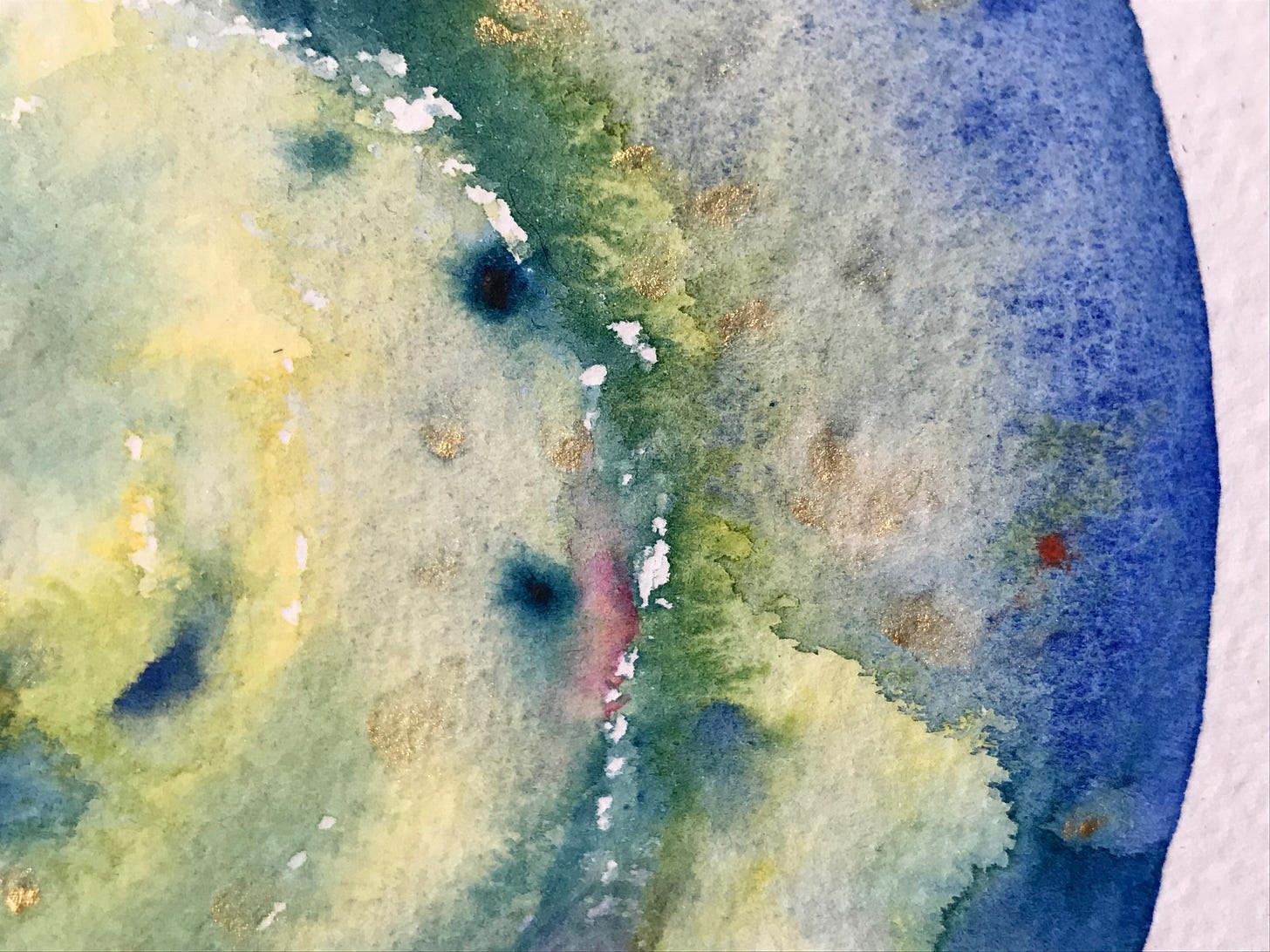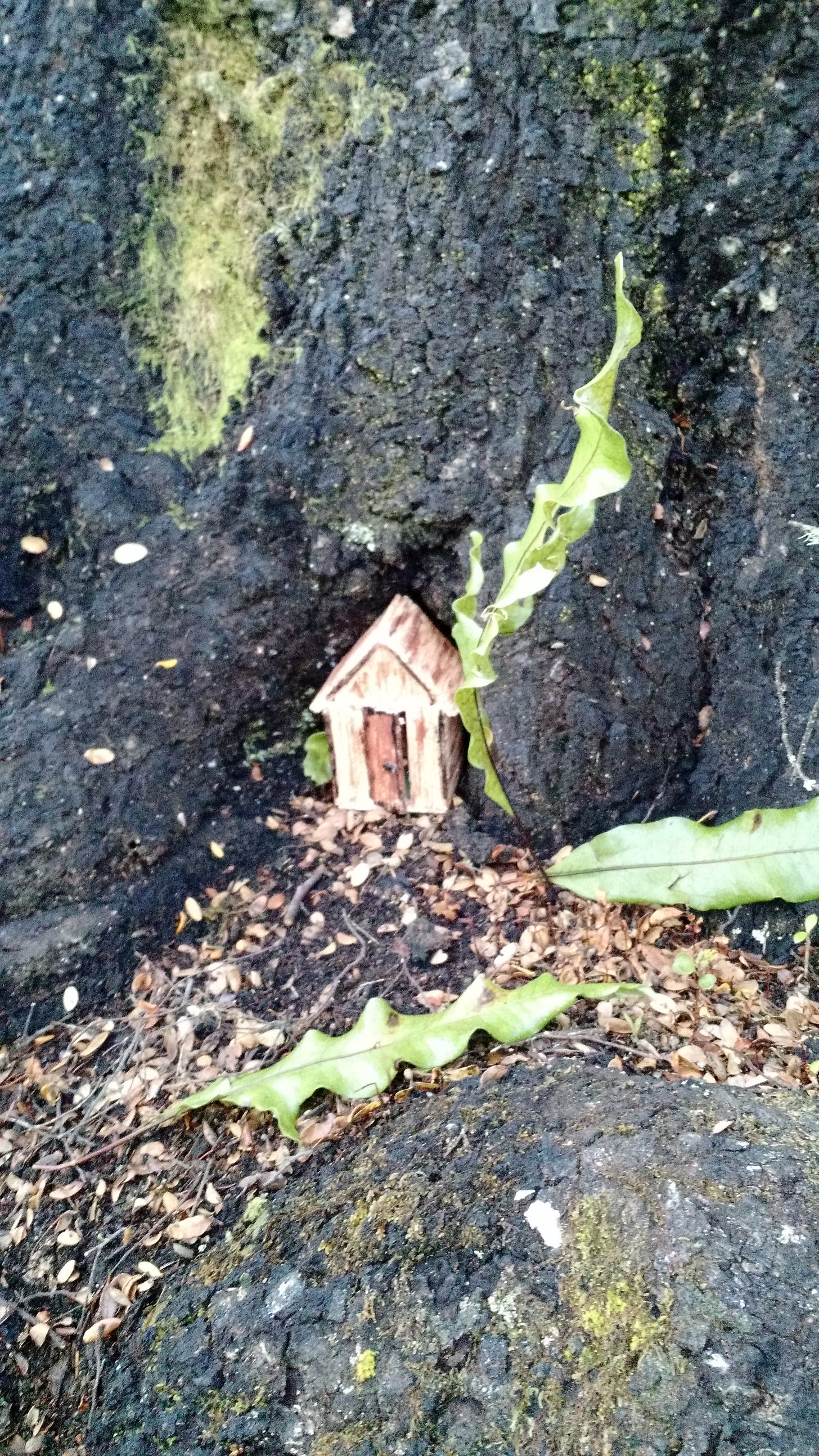Postcards from Home
Talking with strangers, the path to the door and the canvas tent of childhood.
Over King’s birthday weekend, tui came winging back to this side of the valley - flying and courting near the deck. We’ve watched them at a distance and now they’re all around us - singing to one another and swooping past. As we ate lunch on the deck, we admired three tui on a long branch of the kauri. One shiny dark bird was singing out, feathers puffed large - the second tui flew past us as though defeated - while the smaller of the three perched absolutely still, listening to the singer. “Auditioning for a mate?” “I think that’s decided it.” In the background, korimako, bell birds ring their pure single notes. The tone seems to change year-round. The sound is softer in autumn into early winter and the spaces between the notes become part of the song.
*
In the night, wind shook the house. Down the road, a tall native beech fell down the hillside, narrowly missing the roof of a nearby house. The driveway here is a leaf scape of Japanese maple and the path to our door is a confetti of pink camellia petals. These stick to the windows and balance acrobatically on nikau and ponga fronds beyond the bathroom. The camellias are big old trees now, once closely tended shrubs, part of the big garden this side of the valley. After subdividing in the early 50’s, seven properties took place of that one large meandering garden. Now, houses tucked into jungly properties: mid-century homes and 21st century lives.
*
The morning after the storm, I visited our local shopping centre for pre-winter shopping and a routine health check. I’d braced myself for all this, but lo and behold, I enjoyed talking with strangers. A family legacy from my maternal grandmother, who delighted in talking with people wherever she went. When I’m well, I can reach in or reach out and there it is. When this happens, I love how the ordinary world softens and opens into magic. In the supermarket, a man told me how - since his head injury, he finds the lights and noise too much. It makes his brain clench up. He’s had to relearn walking and talking. ‘You wouldn’t believe it but I’m a lot better than I was,’ he told me slowly. ‘I’m here with my mother-in-law. She’s mostly blind and has a wonky hip. We help each other. Her name’s Fiona (not her real name, I like the name Fiona) she’s sitting over there. Say hello on your way out!’ Heading for the door, I stopped to talk with a beaming woman in her 70’s or 80’s. Next to her (the small mercy of places to sit) there were pots of flowering bulbs for sale. Just as winter is getting going, we’re shouldering into spring. After shared laughter and the bright orange spring bulbs, I passed a young goth couple, deep in consultation over their phones. Waiting for the bus, a woman I’ve met before: “I’ve been to the optometrist - I packed for an overnight hospital stay.” “I like your green corduroy bag.” Last time she went to the optometrist she had an eye infection and they whisked her away for four days in hospital. This time her treatment is less urgent. “I’m relieved to be going home actually! It reminds me of a time I went to A&E with terrible pain in my hip, turned out it was wear and tear from Scottish dancing!”
Oh, dear windy Lower Hutt. I’d been swept up in unexpected kindness. The young Samoan woman at the supermarket knew the man recovering from a head injury. She’d noticed he hadn’t been in for a while. At the bottom of the escalator, when I smiled at an Indian man, he raised his hands in a gesture of blessing or prayer. We help each other.
(A slice of watercolour. Sue Matthew ©️)
*
Then I’m home again. Up the leafy drive, across the petalled path and in from the cold. Met by the warm woody smell of the stairs. I’m thinking about places I’ve lived - each has its own smell. Some of these have been small spaces. My mind heads down a well-worn track through long summer grasses, to the square canvas tent of my childhood. In the 1960’s, my parents had a powder blue mini; to little me, the tent almost filled the tiny boot of the car. The smell and shape of the tent, the heavy white sides and a sage green roof, felt like home. The canvas tent is long gone; if I had a photo, it would make a great post card. First find a flat piece of ground or use a spade to even up the surface. Anchor the central pole and push the tent towards the sky, then the corner poles with fine rope (jute, not plastic) stretching the tent to tether on long tent pegs, heel pressed to the earth. The canvas floor was settled in last, over an earth toned hessian skirt, attached on three sides to the lower walls. Flaps at the front swept up to fill the tent with air and light and a view to trees. At night, my mum or dad wove the tent flaps around the wooden entry pole, fine jute through copper eyelets. The rule was, never touch the sides of the tent. I understood this could cause the calamity of a leaky tent and there was something reassuring about this instruction. I wanted to know the rules. At night I could lay in the close comfort of the tent, well back from the side walls. Breathing in the special atmosphere of canvas, with my parents and my brother, breathing alongside me. We were a family of four, soon we would be a family of five, then six and would have different holidays. Soft light and the faint whiff of methylated spirits came from a lantern hanging against the centre pole. In that safe held space, I knew I would never touch the tent sides and so nothing could go wrong.
The tent set me on a path of fascination with small dwellings. At home on weekend mornings, my brother and I made blanket forts in the lounge. My grandparents had a caravan with nubbly squabs to sleep on and nifty cupboards, with tea bags and instant coffee. There were sheds and sleep outs to investigate and lovely dry workshop spaces under houses. My first home away from home as a teenager was a green tent with an orange floor, for two months as part of a festival set up crew. A nylon tent with a different smell to the canvas tent of my childhood, but I still kept my hands off the sloping tent walls. I lived in a caravan on a small community for the best part of a year when I was 18, with my own cupboards and nubbly squabs and where my water jar and paint brush froze overnight in winter. In my 20’s, a friend had a horse drawn caravan and my small son and I stayed there, cozy for a week in a clearing edged by eucalyptus saplings.
(Fairy house beneath native beech.)
*
After a big day out doing big-person-things on a wild wet afternoon, I came home and closed the curtains early. The year I turned 33, three of us shared a house by the sea in new Plymouth. The sea was right there across an old railway line, sparkling still or churning into shore. One day I came home from art school in winter, and the wind seemed to come from every direction. As I stepped out of my car, clutching my latest batch of prints, leaves swirled in a tall spiral column and stopped me for a moment like a visitation from a strange angel. When I reached the house, one of my friends had lit the fire. Someone had pegged the join between the curtains closed. I peered through and the sea was white with spray. I thought of my earliest ancestry to this land and, as it happened, to New Plymouth. In 1842 the two families of my several times great-grandparents made the long voyage from Cornwall by wagon and on foot, and from Plymouth in a ship called the Essex. The wild seas when they reached New Plymouth meant they didn’t come ashore for days. At home in the 1990’s, the kitchen was full of good smells of pumpkin soup and apple crumble. It felt like night at 4.00 pm. “We thought we’d stop pretending it’s nice outside.” Yesterday, home after a good day of talking with strangers, I heard their voices and wrapped that enclosing warmth about me, like the memory of the canvas tent. Pulling the curtains - ‘keeping the sides of the tent dry.’ Leaves from the driveway still fresh with autumn colours. Tui singing to audition for spring…
Sue Matthew ©️







Delicious writing once again Sue. I was drawn into the sound of the birds, so precisely observed by you, and memories of tiny spaces. ‘Shouldering into spring’ — I enjoyed your language.
I can remember well learning not to touch the sides of a canvas tent — unfortunately after I’d already done it and saw the consequences when on a tramping trip. And our first little nylon tent, green and yellow, where my husband and I tried having a honeymoon in pouring rain, but ended up coming home and setting off in a small sailing dinghy a week later.
Thanks for the memories.
Such beautifully captured memories Sue. Your words drew up my own childhood memories of the simple joy in calling an old canvas tent ‘home’ for a few summer camping days. 💜